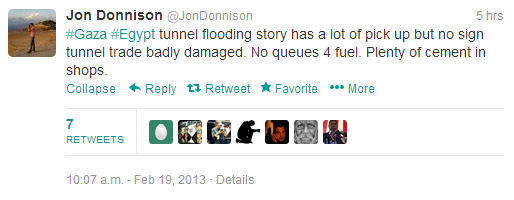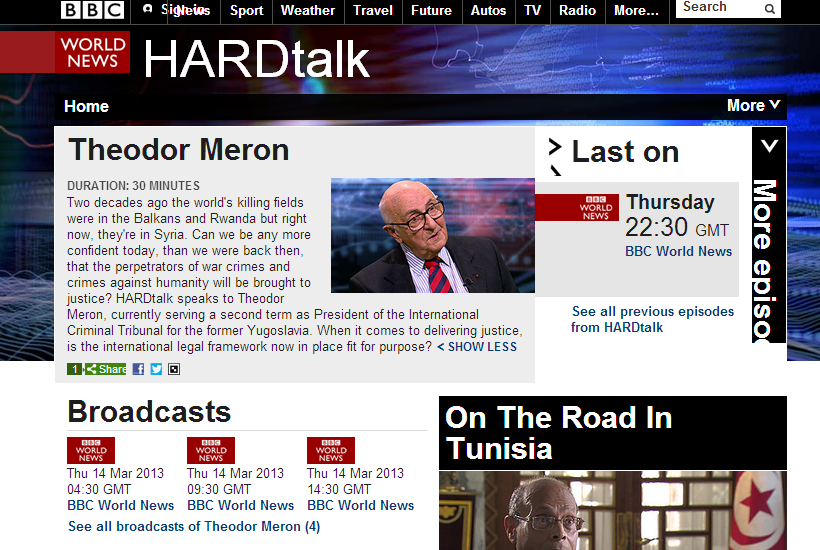“War is an ugly thing but not the ugliest of things;
the decayed and degraded state of moral and patriotic feelings
which thinks that nothing is worth war is much worse.
A man who has nothing for which he is willing to fight,
nothing which is more important than his own personal safety,
is a miserable creature and has no chance of being free
unless made and kept so by the exertions of better men than himself.”
The memo at Guardian HQ explaining the ‘root cause’ of Israel’s operation ‘Pillar of Defense’ evidently has been distributed far and wide within their coven of activist journalists.
While Guardian reporters, and ‘Comment is Free’ contributors, have varied in the degree of malice they impute to the Jewish state for launching strikes against terror targets in Gaza, the message they’ve conveyed to their readers is clear: Don’t believe the Israeli ‘narrative’ that the state is acting to stop thousands of rockets from being launched at their cities by a malevolent Islamist terror group committed to its destruction.
Harriet Sherwood, Simon Tisdall, Ahdaf Soueif, Izzeldin Abuelaish and, of course Steve Bell, are among the Guardian reporters and commentators who are vexed by the idea that the Jewish state would see fit to defend its citizens from a well-armed terrorist movement on its border, and see something more cynical – indeed something much darker – in the decision to launch ‘Pillar Of Defense’.
Jonathan Freedland’s video commentary – ‘Why has Israel decided to attack Gaza now?‘, focusing almost entirely on the supposed electoral reasons behind the war – is a telling case because Freedland is a unique Guardian journalist; he’s a proud Jew who supports Israel’s right to exist as a Jewish state.
Not that Freedland hasn’t in the past succumbed to ‘J Street/Yachad/Peter Beinart leftist narrative which mistakes love for Israel with obsessive criticism, but, by all accounts, he is a decent, reasonable and mostly sober commentator.
However, as you watch this video, you’ll note that Freedland spends about 2 minutes and 37 seconds (out of a 2 minute and 52 second interview) on the alleged electoral reasons, and only 15 seconds explaining the context of Hamas rocket fire.
Additionally, in a full commentary about the war at ‘Comment is Free’, Freedland, in ‘The battle between Israel and Gaza solves nothing‘, Nov. 15, repeats the same reasoning:
“Why did Israel hit back now? The Hebrew press immediately assumed the key date was political, not military: 22 January, when Israelis go to the polls. There are plenty of precedents for outgoing governments taking military action, hoping to create a wave of national unity that will carry them to victory: Cast Lead itself fits that pattern. Binyamin Netanyahu may well have wanted to push aside his Labor rival and prevent his predecessor, Ehud Olmert, making a planned comeback – forcing both to fall into line as patriotic cheerleaders. Similarly, Barak found a way to remind voters of his supposed indispensability.”
However, Freedland’s suspicion of Israeli motives is as notable as his facile understanding of the broader issues of war and peace.
His commentary ends, thus.
“Above all, the pain and anguish inflicted by yet another round of civilian deaths and injury will sow hatred in the hearts of another generation, who will grow up bent on revenge and yet more bloodshed. This keeps happening, decade after decade, for one simple reason: there can be no military solution to the Israeli-Palestinian conflict. Both sides will say the action they have taken is necessary. But it will solve nothing.” [emphasis added]
This last highlighted passage gets to the heart of the matter, and defines, as much as anything, the false, and dangerous, political assumptions of the Guardian Left.
A basic understanding of Israeli history, it seems, would inspire Freedland to take note of the fact that it was the use of force, and the credible threat of force, which has protected the Jewish state from Arab efforts, over the last 64 years, to ‘throw the Jews into the sea’. Negotiations with its enemies didn’t occur organically, but only as the result of Israeli military victories which prompted its defeated foes to grudgingly accept that they did not have the capacity to fulfill their destructive aims.
By what means, other than through military force, would Jonathan Freedland suggest should be used by Israel to defang terrorist groups in Gaza (Hamas, Islamic Jihad, Popular Resistance Committees, and others) which possess thousands of rockets and the will to martyr thousands of their citizens in the cause of Jihad?
The perception of weakness and a lack of resolve – for any nation, yet alone the tiny Jewish state – represents a dangerous provocation.
‘Peace’, when dealing with an enemy committed to your destruction, is not a serious strategy, but merely an empty and quite dangerous platitude.
The overwhelming majority of Israelis, their passionate supporters abroad and defenders of Western democracy more broadly understand this intuitive moral and political fact.
Related articles
- ‘Comment is Free’ contributor: Israeli leaders murder Palestinian children to score electoral points (cifwatch.com)
- US Congressional resolution supporting Israel makes Glenn Greenwald’s head explode (cifwatch.com)
- Guardian publishes cartoon showing Israeli leader as puppet master, controlling Hague and Blair (cifwatch.com)
- The Guardian and the “Zionist SS” (cifwatch.com)
- Harriet Sherwood parrots ugly smear about Israel (cifwatch.com)




